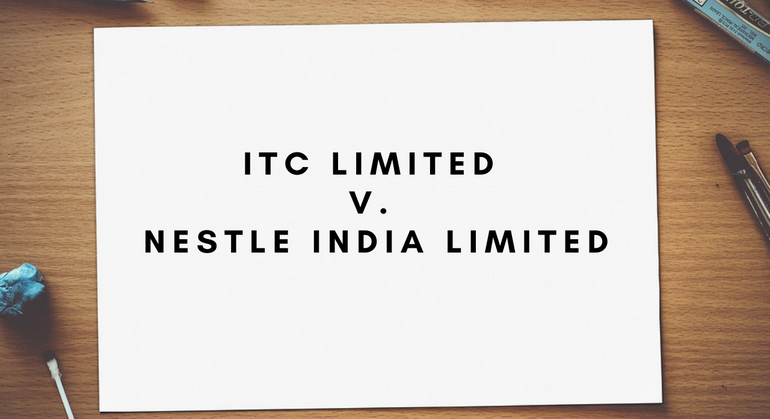

ITC Limited v. Nestle India Limited C.S.No.231 of 2013
Plaintiff, being India’s foremost private Sector Companies, entered the Indian instant noodles market with Sunfeast Yippee! In two variants: (a) Yippee! Magic Masala and (b) Classic Masala. In March 2013 the Plaintiff came to know that the Defendant has launched instant noodles under a similar mark being ‘MAGICAL MASALA’.
Plaintiff filed a suit for passing off against the Defendant alleging that the use of the mark ‘MAGICAL MASALA’ by the Defendant amounts to passing off of the Defendant’s goods as that of the Plaintiff sold under the mark ‘MAGIC MASALA’.
Plaintiff’s Case
- Owing to its excellent quality, geographical reach, and reputation, ‘MAGIC MASALA’ has attained distinctiveness and is associated with Plaintiff alone.
- Retailers in the trade and public ask for the applicant’s noodles by the mark ‘Magic Masala’.
- Defendant has been losing market share to Plaintiff’s noodles and has therefore resorted to unfair competition by using ‘MAGICAL MASALA’.
- Defendant has many variants of its noodles and therefore there is no need of the Respondent to use the mark ‘MAGICAL MASALA’.
Defendant’s Case
- The use of ‘MAGICAL MASALA’ by the Defendant falls within permitted use as per provisions of Section 30(2)(a) of the Trade Marks Act, 1999.
- The defendant is using ‘MAGICAL MASALA’ as a flavor descriptor. ‘MAGICAL MASALA’ conveys flavor and not origin.
- ‘MAGICAL MASALA’ is a laudatory and descriptive epithet lauding the spicy characteristics and quality of Masala, which is sold along with the product in a sachet by the name of ‘tastemaker magical masala’.
- Law of Trade Marks or common law of passing off does not permit any interference in the use of expressions, marks or terms, marks, which are an apt description of character, quality, kind of product, and not used as an indication of source, or original of the product, and the use of the product descriptor in terms of its characters such as flavor, ingredients, benefits, quality, etc, cannot be considered as trademark or mark.
- Defendant’s product is sold under the mark ‘MAGGI’, having 80% market share.
- ‘MAGICAL MASALA’ or ‘MAGIC MASALA’ are common expressions that cannot be a subject matter of any proprietary rights.
- The defendant is using the word ‘MAGIC’ prior to Plaintiff for its products and as far as ‘MASALA’ is concerned, the same is a common word to describe spices. Therefore, the combined use of ‘MAGIC’ and ‘MASALA’ by the Plaintiff is not profitable.
- Both the parties are selling their noodles under their respective brands namely, ‘Sunfeast ITC Yippee’ and ‘Maggi’ which appear very prominently on the labels. Therefore, there cannot be any confusion. This is more so in the light of the fact that the products are sold in entirely different packaging.
- The words ‘MAGIC MASALA’ is widely used not only by the Defendant but also by other manufacturers, like i) Lay’s Magic Masala, ii) Balaji Magic Masala, iii) Hello Just 2 Good! Magic Masala iv) Samrudhni Kitchen Magic Masala, v) SDS Magic
Issues
- Whether the Plaintiff’s mark ‘MAGIC MASALA’ is inherently distinctive or is descriptive but has acquired secondary meaning?
- Whether the Plaintiff has made out a prima facie case for grant of injunction?
Observations of the Court
Issue 1:
The Hon’ble Court relied on McCarthy on Trademarks and Unfair Competition (3rd Edition), to hold that the mark ‘MAGIC MASALA’ is a ‘suggestive trademark’ as imagination is required on the part of the customers to get some direct description of the product from the term.
The Court observed that “descriptive term directly and clearly conveys information about the ingredients, qualities, or characteristics of the product or service, the ‘suggestive term only indirectly suggests these things.”
The Court further observed that the word/mark ‘MAGIC MASALA’ indirectly suggests magical change by consuming the Plaintiff’s product and therefore, the word/mark ‘Magic’ or ‘Magical’ cannot be considered as descriptive and it is an only distinctive word or mark, having secondary meaning.
The Court also observed that having regard to the fact that the word ‘MAGIC MASALA’ is distinctive, the Plaintiff is entitled to the relief of injunction even accepting the case of the Defendant that the trade dress of the two products is entirely different.
Issue 2:
On the second issue, the Court observed that the Plaintiff’s product is popularly known as ‘MAGIC MASALA’, though it is marketed under the brand Sunfeast Yippee, admittedly, Plaintiff is the prior user of the word ‘MAGIC MASALA’, and Plaintiff has proved it’s market share, and considering all these aspects, a prima facie case has been made out by the Plaintiff.
The Defendant was restrained from using the mark ‘MAGICAL MASALA’ or any other deceptively similar mark to the Plaintiff’s mark ‘MAGIC MASALA’ till the pending disposal of the suit.



